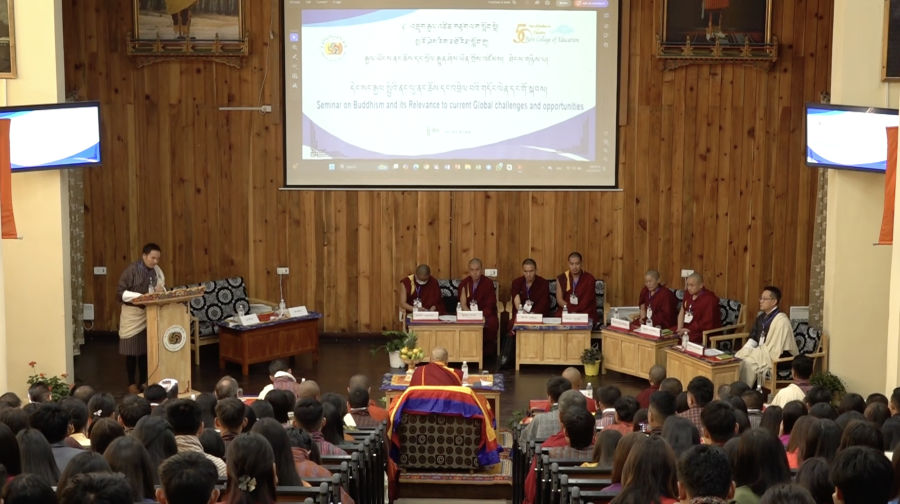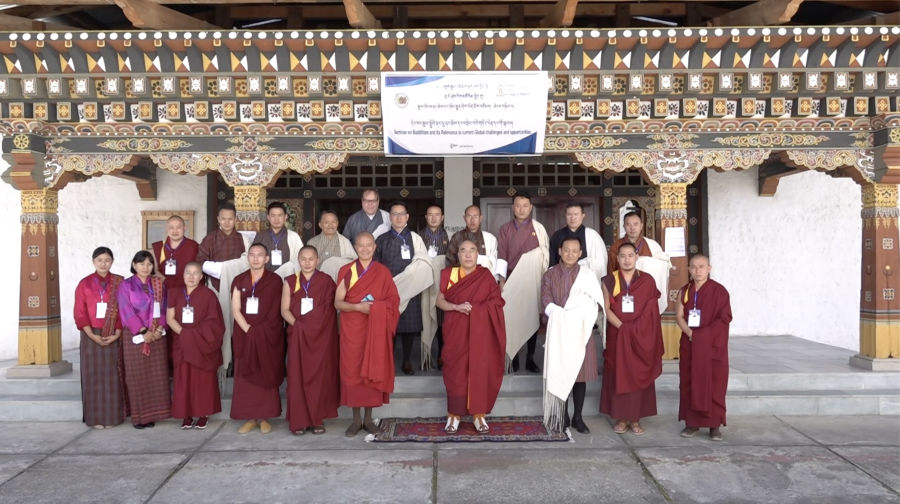 Recognising the potential of technology in spreading spiritual practice and mindful living, monks, scholars, and students gathered at Paro College of Education yesterday to discuss how Buddhism can stay relevant in today’s fast-changing world. They acknowledged that technological advancement, often seen as a threat to Buddhism, can actually be an essential tool for spreading the dharma and promoting peace if used mindfully.
Recognising the potential of technology in spreading spiritual practice and mindful living, monks, scholars, and students gathered at Paro College of Education yesterday to discuss how Buddhism can stay relevant in today’s fast-changing world. They acknowledged that technological advancement, often seen as a threat to Buddhism, can actually be an essential tool for spreading the dharma and promoting peace if used mindfully.
The seminar, titled “Buddhism and Its Relevance to Current Global Challenges and Opportunities,” brought together voices from across Bhutan to reflect on the importance of preserving Buddhist values in today’s fast-changing world.
Speakers highlighted that Buddhism offers guidance for personal growth, mental well-being, and social harmony, making it an essential part of Bhutanese identity and cultural continuity.
“The seminar explored how we can apply the values of Buddhism in development, in our daily lives, and even in maintaining our mental well-being. I’m truly glad to have had the opportunity to take part in it,” said Cheki Jungney, Speaker.
Speakers also highlighted how digital technologies and modern tools, from social media to online learning platforms, can be harnessed as means to share, learn, and preserve ancient wisdom, ensuring that timeless values remain relevant in a rapidly evolving society.
“Today, we have all these digital tools, mobile phones, social media, and countless online platforms that occupy much of our attention. Instead of seeing them as distractions, we can use them as bridges to learn about Buddhism. That’s how we bring timeless values into our modern lives,” said Tshering Dorji, Speaker.
The seminar also highlighted the deep connection between Buddhism and the Dzongkha language, highlighting the need to preserve both. Organisers say the event was held in response to concerns over the declining use of Dzongkha among younger generations.
Conducting discussions and teachings in Dzongkha, they say, plays a vital role in keeping the language thriving.
By actively involving students studying Dzongkha, such seminars also help prepare future teachers to pass on not only the language but also the Buddhist wisdom it carries.
“Even when we talk about Buddhism, it ultimately connects to the Dzongkha language. Many students today are studying Dzongkha, and seminars like this not only help strengthen the language but also prepare future teachers who will pass on that knowledge to thousands of students. That way, we can keep both the language and the wisdom it carries alive. We’re also planning to organise more such seminars in the future,” said Tshering Penjor, Lecturer, Pare College of Education.

The organisers plan to hold more such seminars in the future to help students better understand Buddhism while preserving the Dzongkha language.
Karma Samten Wangda, Paro
Edited by Phub Gyem







